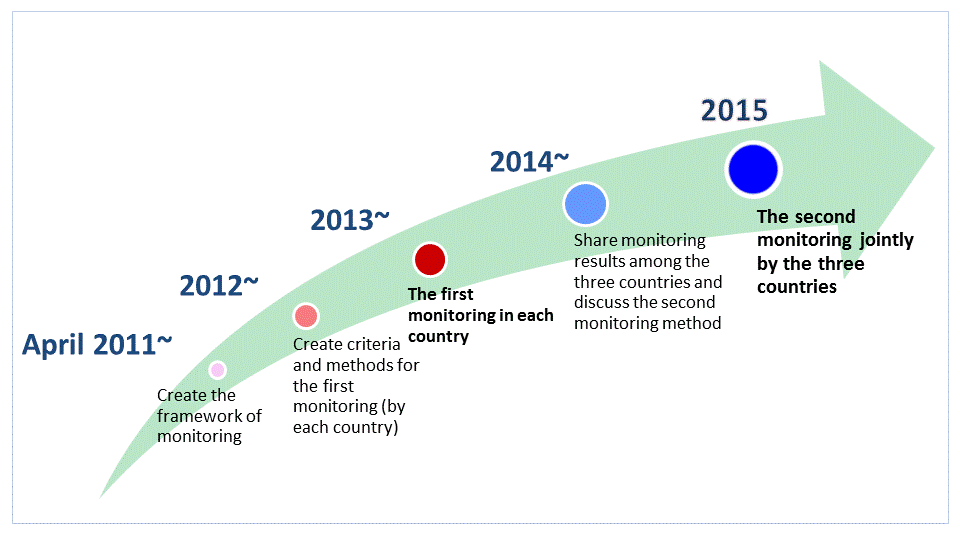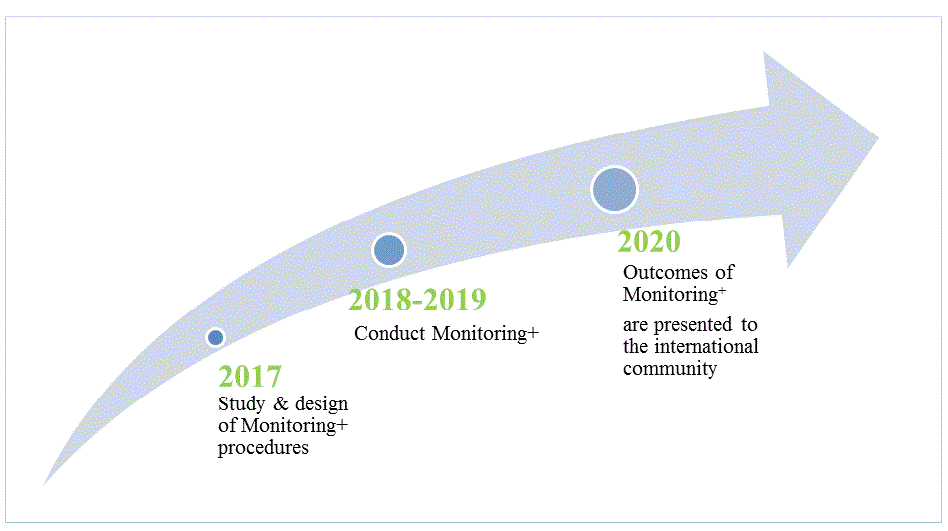
'CAMPUS Asia' Initiative
'CAMPUS Asia' is a government-led initiative with the aim of promoting exchange and cooperation with quality assurance among universities in Japan, China and Korea, in order to strengthen the competitiveness of universities and nurture the next generation of outstanding talent in Asia.
The 'CAMPUS Asia' concept originates in a proposal at the 2nd Japan-China-Korea Trilateral Summit, in October 2009, to hold an intergovernmental expert meeting to consider quality-assured exchanges among the three countries' universities. In response to this proposal, the Japan-China-Korea Committee for Promoting Exchange and Cooperation among Universities launched in April 2010, and reached an agreement to determine the concept of 'CAMPUS Asia' described as above. Concurrently, Guidelines for Exchange and Cooperation among Universities in China, Japan and Korea with Quality Assurance, a joint standard for QA, was established by the three governments, and used for reference when selecting 'CAMPUS Asia' pilot programs.
'CAMPUS Asia' Pilot Program
Under the ‘CAMPUS Asia’ concept, 10 pilot exchange programs were conducted over a five-year period from 2011 to 2015 after a joint review by the governments of Japan, China, and Korea.
List of 'CAMPUS Asia' Pilot Programs ![]() (158KB)
(158KB)
At the 5th Japan-China-Korea Committee for Promoting Exchange and Cooperation among Universities, which met in Shanghai, China, in 2015, three modes were established
to facilitate further development in the future in light of the high achievements of the pilot programs already conducted. The development plan for each mode is as given below.
Mode 1 (2015-): Enhance the openness of the programs (allow more flexible student mobility among programs)
Mode 2 (2016-): Expand the number of participating universities/programs in Japan, China, and Korea
Mode 3 (pending): Expand programs to Asian countries beyond Japan, China, and Korea
'CAMPUS Asia' full-fledged(mode.2) Program
At the First Trilateral Education Ministers' Meeting, held in Seoul, Korea, in January 2016, the three countries’ education ministers expressed their intention to expand
financial support for the CAMPUS Asia Program. Based on that intention, in the fall of the same year, 17 programs (nine new and eight continuing) were selected as
full-fledged (mode 2) programs.
List of 'CAMPUS Asia' full-fledged(mode.2) Programs ![]() (48KB)
(48KB)
Quality Assurance Initiative for 'CAMPUS Asia'
'CAMPUS Asia' Pilot Program
The Japan-China-Korea Quality Assurance Council, launched in 2010 by quality assurance agencies in Japan, China and Korea (NIAD-UE of Japan, HEEC of China and KCUE of Korea), agreed to carry out quality monitoring for 'CAMPUS Asia' pilot programs. This is a joint initiative to support 'CAMPUS Asia' through quality assurance.
The common framework for monitoring agreed upon by the three agencies is as follows:
Purposes of Monitoring
- Address quality assurance of international education on a pilot basis.
- Identify successful practices that encourage education quality, and promote good practices throughout the higher education community.
- Draw up joint guidelines for the quality assurance of transnational education for use by quality assurance agencies in Japan, China and Korea.
Project Process
- Monitoring was conducted twice during the five-year CAMPUS Asia pilot program. The first monitoring was carried out in 2013 and the second monitoring took place in 2015.
- In the first monitoring, NIAD-UE, HEEC, and KCUE carried out monitoring separately, taking into account each country's relevant regulations, and evaluation systems and methods.
- In the second monitoring, all three quality assurance agencies established a common framework for quality assurance and conducted joint monitoring.
- Based on the experience of the second monitoring, they compiled a common monitoring framework and method into joint guidelines.

'CAMPUS Asia' full-fledged(mode.2) Program
"CAMPUS Asia" Monitoring was recognized for the results it had produced and was approved to conduct monitoring for the 8 continuing and 9 new full-fledged CAMPUS Asia programs at the 6th Japan-China-Korea Committee for Promoting Exchange and Cooperation among Universities held in November 2017. In light of the approval, the quality assurance agencies of the three countries deliberated on the details of the monitoring method that would be employed.
The summary of the monitoring plan to be conducted on the full-fledged programs, or "Monitoring+" as it is now called, is provided below.
- Monitoring will be conducted utilizing an advanced monitoring method based on the guidelines developed for monitoring that was conducted twice during the CAMPUS Asia pilot programs (2011-2015) and improved to reduce the workload of the universities.
- Monitoring+ to commence in 2018.
→ The goal of Monitoring+ is to conduct monitoring in 2018, the 3rd year since the commencement of the full-fledged CAMPUS Asia programs, and to provide the monitoring results to the participating programs so that those results can be utilized to their benefit for the 5-year duration of the CAMPUS Asia program. - Monitoring will be conducted on the 9 new CAMPUS Asia programs for Monitoring+. Building on a common quality assurance framework and deepened mutual confidence among the quality assurance agencies of Japan/China/Korea that was developed as a result of conducting 2nd Monitoring in 2015 with a high level of cooperation, Monitoring+ will be conducted with 3 programs assigned to each quality assurance agency of the three countries, with each country made responsible for conducting monitoring on its assigned programs.
- The final results of Monitoring+ will be approved by the Joint Monitoring Committee comprised of committee members from Japan, China and Korea.

